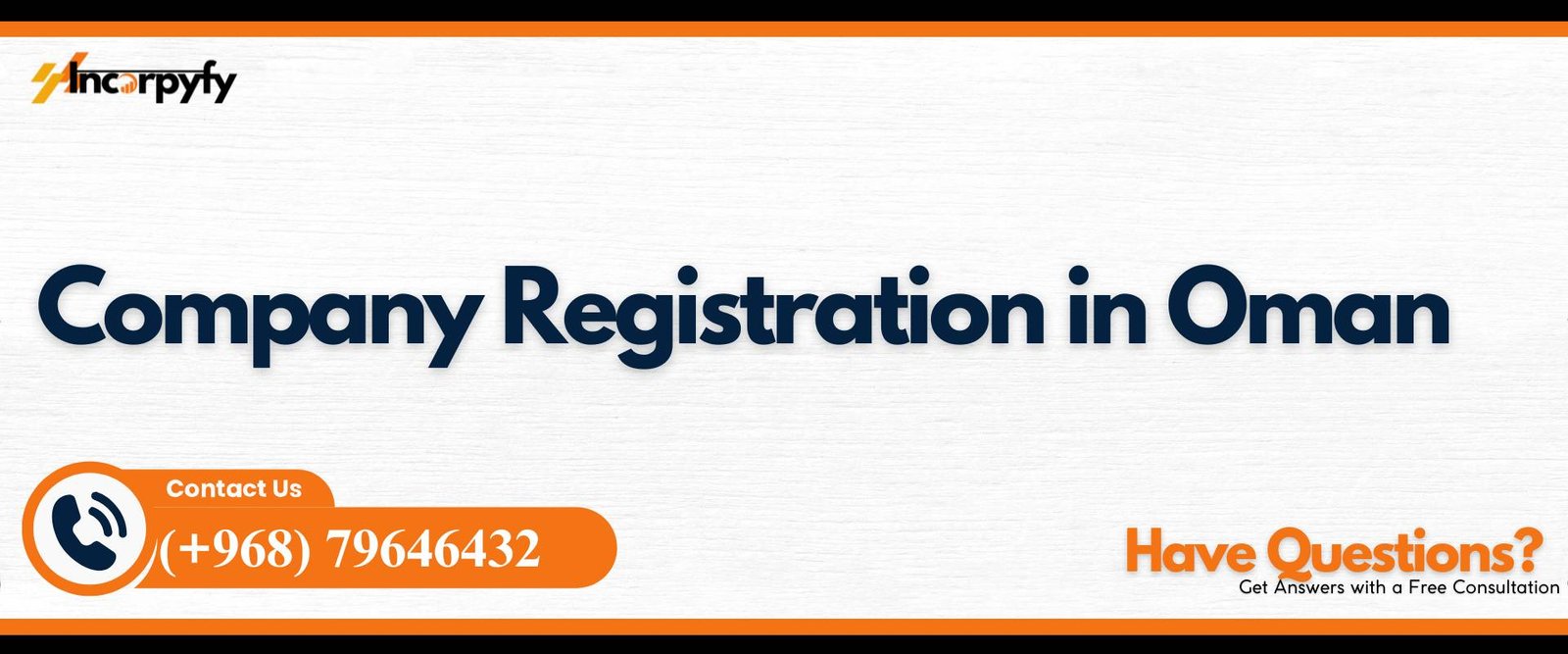
Oman has become one of the most attractive destinations for global investors who want to expand into the Middle East. With its stable economy, strategic location near major shipping routes, and government support for entrepreneurs, company registration in Oman is a popular choice for foreign and local investors alike.
The process of starting a business in Oman is straightforward but requires careful planning, document preparation, and compliance with local regulations. Whether you are an individual entrepreneur or a multinational corporation, understanding the legal structures, costs, and procedures of company formation in Oman is essential to ensure smooth operations.
Why Choose Oman for Business Setup?
Oman offers a unique combination of stability, resources, and incentives that make it one of the best destinations for entrepreneurs in the Gulf.
Strategic Location
Located at the crossroads of Asia, Africa, and the Middle East, Oman provides direct access to major international trade routes. Its proximity to ports such as Salalah and Sohar makes it ideal for companies in shipping, logistics, and trade.
Investor-Friendly Policies
The Omani government has introduced several reforms to simplify business setup in Oman, allowing for greater foreign ownership and encouraging foreign direct investment (FDI).
Growing Economic Sectors
Oman is actively diversifying its economy beyond oil and gas. Key industries include tourism, manufacturing, logistics, fisheries, renewable energy, and mining, offering opportunities for both local and international entrepreneurs.
Legal Framework for Company Formation in Oman
The legal framework for company formation in Oman is designed to regulate business activities, protect investors, and ensure compliance with national laws. All companies must follow the regulations set by the Oman Commercial Companies Law and are supervised by the Ministry of Commerce, Industry, and Investment Promotion (MOCIIP).
Oman Commercial Companies Law
The Oman Commercial Companies Law (Royal Decree No. 18/2019) governs how businesses are formed and operated. It defines the rules for shareholding structures, corporate governance, foreign ownership limits, capital requirements, and dissolution procedures. This law applies to both local and foreign investors.
Role of MOCIIP
The Ministry of Commerce, Industry, and Investment Promotion (MOCIIP) is the primary regulatory authority for company registration in Oman. It handles:
- Trade name reservation
- Company incorporation approvals
- Commercial registration issuance
- Licensing oversight
Free Zone Authorities
For businesses established in Oman’s free zones (such as Sohar, Salalah, and Duqm), regulations are managed by the respective free zone authorities. These authorities provide incentives like 100% foreign ownership, customs exemptions, and tax benefits while maintaining compliance with Omani law.
Foreign Investment Law
Oman has introduced reforms under the Foreign Capital Investment Law (Royal Decree No. 50/2019), which allows 100% foreign ownership in most sectors. However, some strategic sectors may still require a local partner or additional approvals.
Tax and Social Insurance Regulations
The Tax Authority regulates corporate taxation, while the Public Authority for Social Insurance (PASI) oversees employee insurance. Both are part of the compliance framework during and after company formation.
Types of Business Entities in Oman
When considering company formation in Oman, investors can choose from several legal structures. Each entity type has its own requirements, ownership rules, and suitability based on the scale of operations.
Limited Liability Company (LLC)
An LLC is the most common and flexible business structure in Oman.
- Requires at least one shareholder.
- Foreign investors can own up to 100% in many sectors under the new investment law.
- Minimum share capital depends on activity.
- Suitable for small to medium enterprises and trading businesses.
Joint Stock Company (SAOG / SAOC)
A joint stock company is ideal for large-scale projects.
- SAOG (Public Joint Stock Company) can list shares on the Muscat Stock Exchange.
- SAOC (Closed Joint Stock Company) is privately held.
- Requires higher paid-up capital and multiple shareholders.
- Best for businesses seeking public investment or large consortiums.
Branch Office
A branch office allows a foreign company to conduct business in Oman.
- Can perform activities identical to the parent company.
- Requires approval from MOCIIP.
- Commonly used for government contracts and specific projects.
Representative Office
A representative office is limited in scope.
- Cannot engage in commercial or revenue-generating activities.
- Primarily used for market research and promotional activities.
- Useful for companies exploring Oman before committing to full operations.
Sole Proprietorship (Establishment)
A sole proprietorship is a simple entity for individual entrepreneurs.
- Owned by a single person, either local or GCC national.
- Some activities may require an Omani national to hold full ownership.
- Limited liability protection compared to LLCs.
Partnerships
Oman also permits general and limited partnerships.
- General Partnership: All partners share equal responsibility and liability.
- Limited Partnership: Includes at least one general partner and one limited partner with restricted liability.
Steps for Company Registration in Oman
The process for company registration in Oman involves several structured steps.
Step 1: Select Business Activity
Choose from the official list of activities approved by MOCIIP. Certain activities may require additional approvals from government bodies.
Step 2: Choose Legal Structure
Decide whether your business will operate as an LLC, joint stock company, branch office, or representative office.
Step 3: Reserve a Trade Name
Submit a unique company name to MOCIIP that follows Oman’s naming regulations. The name should not violate religious or cultural sensitivities.
Step 4: Prepare Documents
Key documents include:
- Passport copies of shareholders and directors
- Articles of Association (AOA) and Memorandum of Association (MOA)
- Lease agreement for office space
- Bank certificate showing paid-up capital
Step 5: Obtain Approvals
Secure initial approvals from MOCIIP and any other relevant authority, depending on your activity.
Step 6: Deposit Share Capital
Deposit the minimum required share capital in an Omani bank and obtain proof of deposit.
Step 7: Register with MOCIIP
Submit all documents, approvals, and proof of capital to the Ministry for final registration.
Step 8: Register for Tax and Social Insurance
Obtain a tax card from the Tax Authority and register employees under the Public Authority for Social Insurance (PASI).
Step 9: Obtain Licenses and Permits
Depending on your activity, you may require additional licenses from relevant ministries.
Step 10: Open a Corporate Bank Account
With the company fully registered, open a corporate bank account in Oman to manage financial transactions.
Documents Required for Company Formation in Oman
For smooth processing, ensure the following documents are ready:
For Foreign Investors
- Passport copies of shareholders
- Board resolution for company incorporation
- Articles of Association and Memorandum of Association
- Proof of residence address
For Local Companies or Corporate Shareholders
- Certificate of incorporation
- Trade license copy
- Shareholder resolution approving investment
- Passport copies of authorized representatives
Other General Requirements
- Trade name reservation certificate
- Office lease agreement
- Bank confirmation letter for share capital deposit
Cost of Company Registration in Oman
The cost of company formation in Oman varies depending on the business structure and activity.
Mainland Company Costs
- Trade name registration: OMR 50 – 100
- Commercial registration fees: OMR 3,000 – 3,500 (approx.)
- Notarization and document fees: OMR 200 – 400
- Office lease: variable based on size and location
- Total estimated cost: OMR 3,500 – 5,000+
Free Zone Company Costs
Free zones such as Sohar, Salalah, and Duqm offer attractive packages:
- Company registration: OMR 1,500 – 3,000
- Office/warehouse leasing: based on requirement
- Visa allocation fees: OMR 300 – 500 per visa
- Total estimated cost: OMR 2,500 – 4,500+
Taxation and Accounting in Oman
Businesses in Oman must comply with corporate tax laws, VAT regulations, and IFRS accounting standards. The corporate tax rate is 15%, while VAT is charged at 5%. Companies must maintain proper records, conduct annual audits, and ensure accurate reporting to avoid penalties and ensure smooth compliance.
Corporate Tax
- Standard corporate tax rate: 15%.
- Small businesses may qualify for reduced rates.
VAT in Oman
- Introduced in 2021 at 5% VAT on goods and services.
- Businesses must register for VAT if their annual turnover exceeds the threshold.
Accounting Standards
- Companies must follow International Financial Reporting Standards (IFRS).
- Annual financial statements must be audited by a certified auditor.
- Records must be retained for at least 10 years.
Benefits of Company Formation in Oman
Company formation in Oman offers many advantages, including 100% foreign ownership in most sectors, low corporate tax, access to GCC markets, and strong infrastructure. Investors also enjoy free zone incentives like customs exemptions and tax holidays, making Oman a strategic choice for entrepreneurs seeking regional and global expansion.
100% Foreign Ownership
Recent reforms allow full foreign ownership in many business sectors.
Strong Infrastructure
Modern ports, airports, and industrial zones make Oman a hub for logistics and trade.
Low Tax Environment
With a corporate tax of only 15% and no personal income tax, Oman is highly attractive.
Free Zones with Incentives
Free zones offer tax holidays, duty exemptions, and simplified import/export regulations.
Access to GCC and Global Markets
Oman’s trade agreements give investors access to GCC, Arab League, and international markets.
Free Zones in Oman for Company Setup
Oman has several free zones that provide attractive benefits for foreign investors.
Sohar Free Zone
- Focuses on logistics, metals, and petrochemicals.
- Offers long-term tax exemptions.
Salalah Free Zone
- Located near key shipping lanes.
- Specializes in manufacturing, assembly, and distribution.
Duqm Special Economic Zone
- Largest in the Middle East.
- Covers logistics, ship repair, fisheries, tourism, and heavy industry.
Renewal of Company Registration in Oman
All companies must renew their commercial registration annually.
Renewal Requirements
- Updated office lease agreement
- Paid renewal fees
- Updated shareholder information (if applicable)
Penalties for Non-Renewal
Failure to renew on time may result in penalties, blacklisting, or suspension of operations.
Challenges in Company Registration in Oman
While company registration in Oman is straightforward, challenges remain. These include strict banking compliance, sector-specific foreign ownership restrictions, and lengthy licensing procedures. Documentation in Arabic and approval from multiple authorities can cause delays. With expert guidance, investors can overcome these barriers and establish their businesses efficiently and compliantly.
Foreign Ownership Restrictions (Certain Sectors)
Although reforms allow 100% ownership, some sectors still require a local partner.
Banking Compliance
Opening a corporate bank account can be time-consuming due to strict compliance checks.
Licensing Approvals
Certain industries require multiple government approvals, which may delay the setup process.
Language and Documentation
Most documents are in Arabic, requiring official translations for legal submissions.
Conclusion
Setting up a business in Oman offers investors access to a growing economy, strong infrastructure, and supportive government policies. By following the legal procedures and ensuring compliance with tax and accounting requirements, entrepreneurs can benefit from Oman’s strategic position and favorable investment environment. For smooth setup and professional support, it is recommended to work with experienced Business Setup Consultants in Oman.
FAQs
Can a foreigner own majority shares in an Omani company?
Yes. Recent reforms allow 100% foreign ownership in many business sectors, especially for LLCs and companies in free zones.
Is a foreign company allowed to open a branch and representative office in Oman?
Yes. Foreign companies can establish a branch office to carry out activities related to the parent company or a representative office for market research and promotion.
What are the investment incentives offered in Oman?
Oman offers tax holidays, customs duty exemptions, simplified repatriation of profits, and free zone benefits to encourage foreign investment.
What is the corporate tax rate in Oman?
The standard corporate tax rate is 15%, with reduced rates for certain small businesses.
Is Value Added Tax (VAT) applicable in Oman?
Yes. Oman introduced 5% VAT in 2021, applicable to most goods and services once the turnover threshold is met.
How much does it cost to register a company in Oman?
The cost ranges from OMR 3,500 to 5,000+ for mainland setups and OMR 2,500 to 4,500+ in free zones, depending on activity, licenses, and office space.






